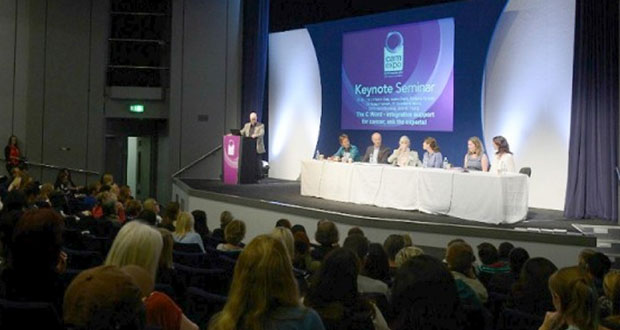Camexpo 2016 Panel Debate Looks At The Key Challenges Of ‘Caring For An Ageing Population’
 Complementary health practitioners are increasingly required to support clients with multiple conditions linked to aging – from brain health and mobility issues to nutritional deficiencies. This month’s camexpo event, taking place over the weekend of 24-25 September at London’s Olympia, is to host its first panel discussion into ‘Caring for an ageing population’, with a specific focus on complementary and integrative health care strategies.
Complementary health practitioners are increasingly required to support clients with multiple conditions linked to aging – from brain health and mobility issues to nutritional deficiencies. This month’s camexpo event, taking place over the weekend of 24-25 September at London’s Olympia, is to host its first panel discussion into ‘Caring for an ageing population’, with a specific focus on complementary and integrative health care strategies.
The panel will feature Margaret Coates, chief executive & registrar at the Complementary and Natural Healthcare Council (CNHC); leading nutritionist Dr Marilyn Glenville; Dr Robert Verkerk, founder of Alliance for Natural Health International; Tracey Smith, reflexology and research manager at the Association of Reflexologists; and (chair) Jim Manson, editor of Natural Products News.
As a nation, the UK continues to get older – and people live longer. The average age of the population is now 40 years old, compared to 38.7, ten years ago. In mid-2015, when the latest population estimates by the Office for National Statistics were released, over 11.6 million (nearly a fifth) of people in the UK were aged over 65. That’s forecast to rise to one in four people (24.2%) by 2040, with the number of 85 year olds set to double to over 3.4 million.
Given these figures, it’s clear that the impact of an aging population – particularly on health care provisions – is potentially huge. Yet vitally this challenge also presents an opportunity to adapt the existing frameworks of health and social care, to promote good health and wellbeing as well as continuing to increasing life expectancy. For what is one without the other?
A focus on wellbeing
“Complementary healthcare has a key role to play in supporting the wellbeing agenda,” says Michael Watson, chair of the CNHC. He believes there’s “never been better time to be a complementary health practitioner” and that focusing on the long term can benefit the health care of all ages.
In an open letter to the complementary health community, posted to the camexpo website earlier this month[3], he said:
“Now, more than ever before, there is a focus on wellbeing. We are all living longer and for many this means managing – rather than curing – a range of long term conditions. The big question now is how do we support people to maintain a good quality of life and manage their wellbeing over the long term?
“This is where complementary healthcare comes into its own. Amongst other therapies we have nutritional therapists who can provide well-informed, evidence-based guidance over diet, exercise and lifestyle. We have a range of hands-on approaches such as massage, aromatherapy, Bowen therapy, reflexology, shiatsu, sports therapy, acupuncture, healing and reiki that can help to reduce stress, ease symptoms, support sleep and so much more. We also have approaches such as Alexander Technique teaching, naturopathy and yoga therapy, which encourage improved self-management, as well as the easing of symptoms. And we have hypnotherapy, which provides support for tackling a range of issues and encourages a healthy, positive mindset – vital to those who want to continue to get the most out of life for the long term.
“We know that complementary therapies are popular with the public – estimates suggest that it used by one in five members of the public. However, much of this is provided in private practice and I want to see it become far more widely available in mainstream health and care services.
“In my view, an integrated approach where patients have far greater access to a range of healthcare professionals – including complementary therapists – must be developed.”
Helping people age well
Dr Marilyn Glenville, the UK’s leading nutritionist specialising in women’s health, has been championing an integrative approach – giving patients access to the best choice of both complementary and conventional medicines and therapies – for many years. She agrees that “the complementary and integrative health sector has a lot to offer people in order to help them age well”.
“I think the key challenge [of an ageing population] is for people to have a good quantity of years as they get older but also a good quality”.
“It is no good if medical advances can extend life by another 20 years or so, if people aren’t mentally and physically well and alert enough to enjoy those extra years. With good nutritional and lifestyle advice it is possible to make a huge difference to the ageing population, for people to have a better quality of life, with improved physical and mental health, and to also to work with them on prevention,” she says.
Quality of life
Having a good ‘quality of life’ means different things to different people, at different times. Loneliness, for example, can affect the health and quality of life all ages. But the elderly can be especially vulnerable. Tracey Smith, reflexology and research manager at the Association of Reflexologists, believes that therapies and treatments that promote ‘empathic touch’ something people living in social isolation often lack – could help them feel less alone.
“As we age several of our senses start to fade, but one sense, the sense of touch can simply be neglected,” says Smith.
“In the later years the opportunities for touch decline, sometimes becoming reduced to functional touch alone. Studies have shown that premature babies thrive more with gentle massage, so it could be assumed that touch is very much needed for health. Empathic touch, albeit through massage or reflexology, can help build wellbeing and also help combat that other enemy of old age, which can be loneliness,” she says.
She says she’s seen an increase in the number of over 70s seeking out reflexology or massage treatments over the last few years.
“I think that there is general increased understanding of complementary therapies in this age group, perhaps coming from their children’s greater understanding. There are also many residential homes that are now offering touch therapies as part of their activities too,” she says.
Workable strategies
“There’s never been a better time for a high-level chin wag on this key issue,” says Dr Robert Verkerk, founder of Alliance for Natural Health International, ahead of his appearance at the show.
“Drugs have consistently failed to deliver the goods for our rapidly ageing population. And while many of us would agree profound solutions are within easy reach with dietary and lifestyle changes and an overflowing natural medicine toolbox, we’re some way from having consensus on priorities. I’m confident this panel debate will bring us closer to agreeing some of the most workable and effective strategies for the practitioner community,” he says.
camexpo’s ‘Caring for an aging population’ Keynote panel session will take place at 3.15pm in the Keynote Theatre on Saturday 24 September.
Cancer, vitamin deficiencies, childhood obesity, Lyme Disease, and brain health, are just some of the other subjects under discussion in the Keynote and Nutrition Theatres at camexpo 2016 – the UK’s leading health and wellbeing event.
For further seminar information, please visit www.camexpo.co.uk/education/keynotes.New for 2016, all workshops and seminars at the show are now CPD-accredited.
camexpo returns to Olympia, London, on 24-25 September 2016. For more information, and to book an entry ticket for £8.50 (saving £16.50 off the door charge), please visit www.camexpo.co.uk and use priority code CAMX524 (workshops cost £19.50 per session).






